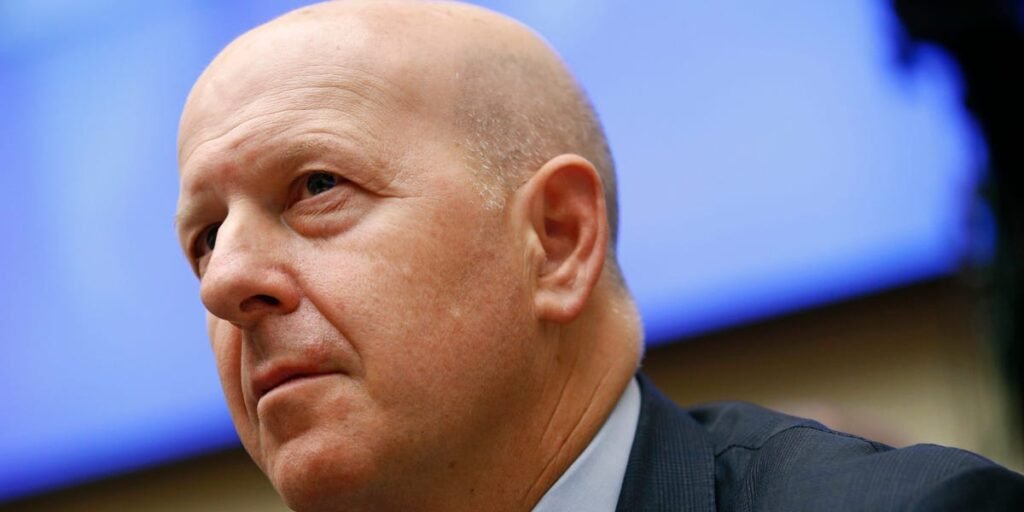Goldman Sachs CEO David Solomon is advising clients to closely monitor how policy shifts from Washington impact the global business landscape, adding that he’s hopeful for a resurgence in M&A volumes later this year.
“When you get outside of the US and I listen to CEOs, I hear a greater sense of short-term concern, but everyone would like less uncertainty and more clarity,” Solomon told analysts and shareholders in a Monday morning conference call to break down the firm’s first-quarter performance. “My guess is, over time, this level of uncertainty will come down, and my general message to people is to go slow and take a pause here until we have more clarity around a lot of these issues.”
Solomon was referring to the recent political uncertainty and a global markets frenzy spawned by White House policy decisions to impose, and then back off from, aggressive tariff measures on foreign trading partners. The resulting markets volatility left Wall Street facing down a conundrum in the first quarter: Traders rode the wave to record revenues, while the momentum that bankers hoped would enable corporate dealmaking to flourish again was all but eviscerated.
Still, Goldman reported robust earnings for the first quarter of 2025, surpassing analyst expectations. The firm said it had generated net revenue of $15.06 billion during the first quarter, up about 8.6% from $13.9 billion in the previous quarter, which concluded at the end of 2024; and also up about 6% from the same quarter one year ago.
“Ongoing policy uncertainty and market volatility drove many clients to reposition their portfolios,” lifting trading volumes in the firm’s global banking and markets business line, Solomon said on the conference call, according to a transcript by the investment research platform AlphaSense. “In investment banking, the volatile backdrop led to more muted activity relative to the levels we had expected coming into this year.”
Washington whiplash helps traders, hurts bankers
Solomon added later that some clients overseas had grown jittery as they watched the whiplash play out from Washington.
Since the start of the year, Wall Street has been strapped in for a bumpy ride as it has tried to make sense of the convulsive policy changes from Washington. Global indexes were thrashed last week as a result of President Donald Trump’s policy announcements tied to tariffs and renegotiations with international trading partners.
“What we’re hearing from clients — particularly it applies in Europe and other places around the world — is they don’t like the level of uncertainty, and they don’t like the fact that certain constructs for how they interact with the US economic system and the global economic system are potentially changing,” he continued. “It’s early to call heads or tails or direction of travel on how this will play out.”
Traders have reaped the rewards of the selloff, which rattled economists, provoked fears of a bear market, and inflamed recessionary anxieties. Take Goldman’s global banking and markets business line, where traders reported net revenue of $10.71 billion in the first quarter, 10% higher than the previous quarter and up 26% versus the same period last year. Record net revenue in equities — trading revenue was $4.19 billion, up 27% from the first quarter last year — was the big driver of success in this business line.
Investment banking faces ‘a risk’
Overall investment banking fees were $1.91 billion, down 8% from the first quarter of 2024, citing softer performance in advisory. In recent weeks, bankers have turned to trying to drum up new business in a challenging environment, and keeping clients abreast of the seemingly hour-by-hour developments.
Investment banking advisory revenue dropped 22% from the same period last year, amounting to $792 billion this quarter. That’s also down 18% from the nearly $1 billion Goldman generated in the prior quarter. The bank successfully defended its leading position on the M&A league tables.
Solomon offered a few reasons to be hopeful about the precarious investment banking landscape, saying that the pipeline of deals the bank was juggling was growing.
“As we stand today, our client dialogues remain elevated, and our backlog is up for the fourth consecutive quarter,” the CEO said. “That being said, our ability to executive on these transactions will of course be dependent on market conditions.”
In fact, he’s vowing to win an all-important slice of the M&A pie — if it ever materializes.
“There’s no question there’s been a pickup in activity and monetization” from financial sponsors who hold billions in liquidity, but have been trepidatious about pulling the trigger on leveraged buyouts amid uncomfortably high interest rates. Solomon said “there’s no firm better positioned to capitalized on that than Goldman Sachs” when the dam finally breaks under “enormous pressure” from investors to see returns on their capital commitments to various funds.
“For a period of time, there’ll be some uncertainty around how certain things that were close proceed forward,” he later told another bank analyst on the call. “But I would expect a significant amount of M&A activity through the rest of the year. But obviously, if the landscape got more constrained, there’s a risk of it slowing.”
Reed Alexander is a Wall Street correspondent at Business Insider. He can be reached via email at ralexander@businessinsider.com, or SMSthe encrypted app Signal at (561) 247-5758.

